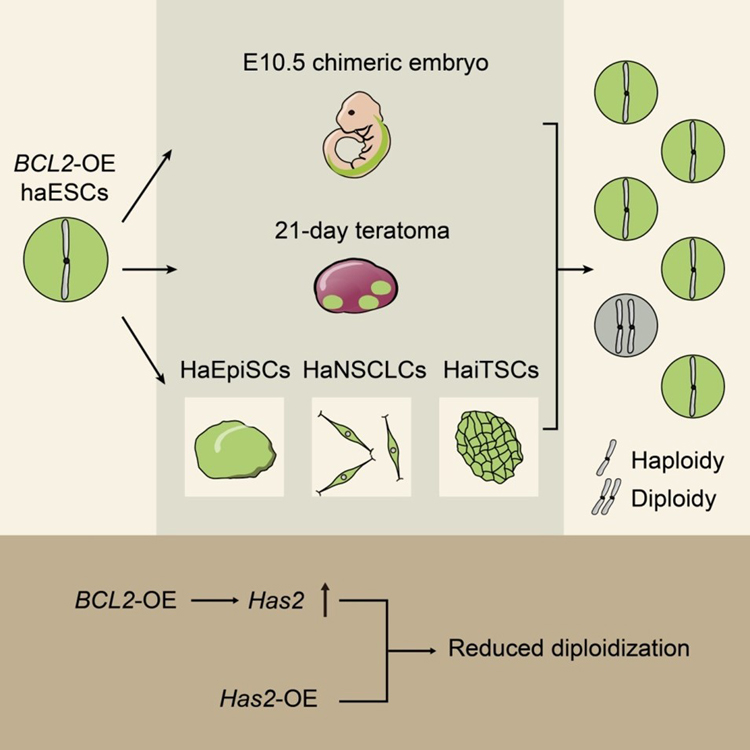NKU Research Team Enhances the Haploid Tool for Genetic Screening with New Strategy

Diagram of BCL2-OE effectively stabilizing haploidy of haploid cells in routine cell culture and differentiation in vitro and in vivo
The research group led by Prof. Shuai Ling (the State Key Laboratory of Medicinal Chemical Biology, Nankai University) introduced an antiapoptotic gene, BCL2, into the murine haploid embryonic stem cells (haESCs) for a successful overexpression of BCL2 (BCL2-OE), which can robustly ensure their haploidy maintenance in various condition, even under strict differentiation in vitro and in vivo. The research result not only further proves the self-diploidization of haESCs can be effectively inhibited by anti-apoptosis, but also lays a solid foundation for the application of haploid cells in screening for drug target, cell differentiation and others. The research further improves the contribution of haploid cells for genetic screening.
In this study, the team led by Prof. Shuai demonstrated that anti-apoptosis was benefit to the stabilization of haploidy in cell cultures and differentiation potential of BCL2-OE haESCs. They also found BCL2-OE can effectively improve haploidy maintenance of the cells under harsh conditions without undermining their embryonic development potential by anti-apoptosis.
Based on this, the researchers systematically compared the haploidy maintenance ability of BCL2-OE and wild-type haESCs during routine cell culture, embryoid body aggregation during differentiation in vitro, chimeric embryo and teratoma formation. They found that BCL2-OE can significantly enhance the haploidy maintenance of haESCs than wild-type ones and achieved BCL2-OE haESCs contributing to normal chimeric embryos at E10.5 with a very high proportion of haploid cells for the first time. The transcriptome analysis revealed that BCL2-OE activates the expression of Hyaluronan Synthase 2 (Has2) and improved anti-apoptosis and haploidy maintenance of haESCs by regulating miR26b-Has2-HA-Caspase pathway. Stable maintenance of haploidy in haESCs can also be achieved by Has2-OE.
“Our research not only proves haESCs can differentiate into any type of cells in theory, but also comprehensively promotes the development of haploid system in lineage-specific screening.” said Prof. Shuai.
The paper was published on Cell Proliferation, a well-known online-only scientific journal covering cell biology. Doctoral student Sun Shengyi and postgraduate student Zhao Qin of College of Pharmacy of Nankai University are the co-first authors of the paper. Prof. Shuai Ling and Dr. Zhang Wenhao of the State Key Laboratory of Medicinal Chemical Biology of NKU, and Prof. Zhang Xiao’ou of School of Life Sciences and Technology of Tongji University, are the co-corresponding authors.
Link to the paper: https://onlinelibrary.wiley.com/doi/10.1111/cpr.13498
(Edited and translated by Nankai News Team.)









